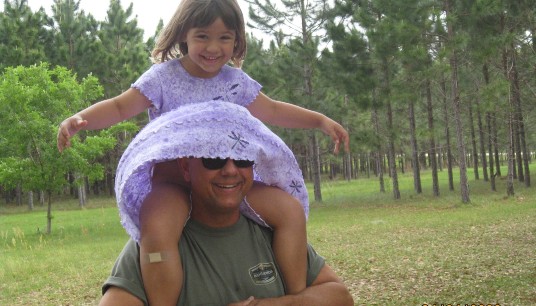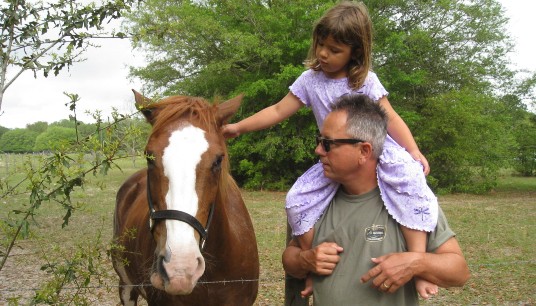
My college-age daughter’s warm sense of humor shows up regularly now over coffee on the Sunday mornings we head to Starbucks. It’s become a ritual we both love, and it’s sustained us through some tough seasons. We laugh and talk about nothing. Every now and then, we talk about something important, but rarely. Mostly, our relationship consists of just “hanging out”. I’ve learned to listen and keep my judgments lightly expressed. Our mood is soft and enjoyable, and I feel like I’ve been sitting with my best friend. She’s making her way through university with a fair degree of success. Still living at home is, for all of us, a balancing act of patience, but we’ve both learned the dance of cooperation and mutual respect. As many of my clients similarly express in family relationship therapy, it hasn’t always been this way.
Of the many memories of my daughter’s childhood I treasure, one stands out clearly. I have a photograph of the moment. She rides along on my shoulders at three years old during a trip to Key West. The warm southern wind swirls her tiny purple dress, covering my face, and we both laugh hysterically. She’s wearing the same small purple outfit in a photograph beside a beautiful chestnut horse in the woods near the Suwanee River in North Florida. I can still remember feeling her tiny feet balancing against my chest as she leaned down to pet him. I have carried this tiny passenger over many miles since then.
Making The Transition From Diapers To Dating
Sweet sixteen is no different, and we celebrated with an army of her friends at the local banquet hall, complete with Chick-fil-A and a limousine. The DJ was on a roll, playing hit after girls’ hit, line dancing, and delighting in the laughter and squealing that erupted. I think that was the summer things changed for us. Academic failures plagued her. She was diagnosed with mild ADD. Our choice of schools probably wasn’t ideal. Her choice of boys left a lot for her mom and dad to desire, but we kept our patience. I had some success as her math coach in high school, but it was far from perfect. I’m not sure I’d recommend it to anyone else. It is better to find outside help, I’m sure.
Struggles with focus problems, along with her own stubborn nature, set us at odds more than I like to admit. I worked hard to avoid scolding and express empathy and understanding. Our family therapist encouraged us to be patient with her relationship with “starter boyfriend” and try our best not to judge. This, of course, was difficult for two “helicopter” parents horrified at perceived cracks in our perfect imagination of her future. She did finally get rid of “starter boyfriend”, only to choose another boyfriend equally unsuited. It was Bill Bryson, in his famous Kindergarten book, who said, “Stay out of your children’s love lives during teen years. Trust you’ve raised them right and start letting go.” Easier said!
Some dark months followed that summer, including her not coming home, turning off her phone, and distancing herself from us quite dramatically. Thank God for Grandma’s house during this time. It became a haven for her when she was hurting and confused the most.
Accepting The New Dynamics Of Our Relationship
So how’d we survive? I’ll offer a couple of examples that were far from perfect, but seemed to work. The most helpful tip came from our family therapist. “Important decisions have to belong to her”, he’d say, “otherwise when inevitable disappointment arrives, she’ll get to blame you guys!” This was most helpful, but very hard to do. How do loving parents let their children fail? I’d dreamed one night of hiring a hit man for the boyfriend. But how would that work out? She’d only be mad at me and still resolve to stay with him!
But honestly, we persevered. We opened our home to “starter boyfriend” and encouraged her to invite him over on Sundays. We stopped fighting it and actively supported her choices. The more she felt free to judge for herself, the more relaxed we all became. The less harsh judgment we expressed her way, the warmer our relationship became. “Starter boyfriend” hung around for a bit but was soon history. This turned out to be a huge growth experience for all of us. She matured. We relaxed a lot. We’re still working on it. Each year that passes brings more goodwill and connection. We have so much to be grateful for.
Relationship Tips From A Family Therapist In Florida
If you or someone you love is trying hard to raise a teenager, here are a few ideas I’ve found helpful in creating and maintaining emotionally healthy parent/teen relationships. The following is a bit of a summary of all we learned, much of which I frequently highlight during relationship therapy.
Be The Example In Your Relationship
Teens can be outrageously emotional! From zero to crazy can be very fast. If you want your teens to handle emotions well, the best place to start is with yourself. Let them see you express feelings in a healthy way — like saying, “I’m feeling stressed, so I’m going to take a walk to clear my head.” They’re always watching how you deal with stuff, even when it seems like they aren’t.
Make Emotions Feel Safe
You want them to feel like it’s okay to talk about whatever they’re feeling, not just the “easy” emotions like happiness, but the messy ones, too. If they come to you upset, resist the urge to shut it down or fix it right away. Just listen first. This is always the first step I recommend at my therapy practice in Florida.
Help Them Find The Right Words
So often, briefly sharing my own words of experience encouraged my daughter to find her voice. Teens often get stuck in basic labels like “mad” or “sad.” Help them dig a little deeper: Are they frustrated? Embarrassed? Nervous? Giving them better language for their feelings can seriously change the way they handle tough moments.
Validate Before You Problem-Solve
Before you jump in with advice, just acknowledge what they’re feeling. Something like, “It makes total sense you’d be upset about that,” goes a long way. It shows you’re on their side, even if you don’t totally agree. This gives them a safe space to heal and grow.
Coach, Don’t Control The Relationship
Instead of telling them exactly what to do, guide them with questions. Try asking, “What do you think might help?” or “How do you want to handle it?” They’ll learn to trust themselves — and come to you when they actually want advice.
Practice Seeing Things From Other Perspectives
Help them imagine what someone else might be feeling. This could be as simple as talking about a character from a movie you just watched: “Why do you think she reacted that way?” It’s a sneaky but powerful way to build empathy, one that I often recommend for family and couple relationships.
Teach Healthy Coping Skills
Stress is unavoidable, so it’s better they learn how to deal with it early. Show them things like journaling, going for a run, listening to music, and even just breathing techniques. Make it clear that asking for help is a strength, not a weakness.
Celebrate The Effort, Not Just The Outcome
When they handle a situation well, even a little bit, notice it. Something like, “I’m proud of how you calmed yourself down after that fight,” teaches them that the effort to manage emotions is what really matters, not being perfect.
Talk About Emotional Skills Directly
As a child and family therapist in Delray Beach, I often remind clients that sometimes, it helps to be super clear. Bring up things like managing anger, motivating yourself, or being a good listener in everyday conversations. Teens actually like practical tips, as long as it doesn’t feel like a lecture.
Be Patient With Your Changing Relationship
This was a long game for us. Still not over. Some days they’ll totally surprise you, and other days they’ll act like they never heard a thing you’ve said. That’s normal. Stay steady, keep modeling, and trust that it’s sinking in over time.
My Saturday mornings are usually reserved for teens, young adults, and their families. If you think I can be helpful, don’t hesitate to reach out.
Begin Family Relationship Therapy In Delray Beach, FL
If your relationship with your child has become strained, relationship therapy is a great way to learn how to navigate and accept ongoing changes. Using my own experience and reliable therapeutic frameworks, I regularly work with families at my Florida therapy practice. Here’s how you can start family relationship therapy with me today:
- 1. Schedule an appointment to meet with me
- 2. Work with an experienced family therapist
- 3. Maintain a healthy relationship with your child
Other Services John Davis Counseling Offers In Florida
Our Florida therapy practice offers more than just relationship counseling. We recognize that clients often face a variety of concerns, and we provide both in-person and online counseling options to meet your needs. John Davis specializes in several areas, including anxiety therapy, trauma therapy, addiction counseling, couples counseling, and treatment for narcissistic personality disorder. He also helps clients work through challenges like infidelity, impulsivity, mood-related issues, and spiritual struggles.
John also provides counseling for parenting, ADD/ADHD, and grief from unexpected loss. His approach is flexible and personalized, incorporating a range of therapeutic techniques such as EMDR, CBT, Gestalt, mindfulness, clinical hypnosis, and psychodrama. For more information or helpful insights, visit the John Davis blog or get in touch to schedule an appointment.


